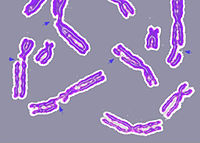
Photo from wikipedia
Loss of function in DNA methylation regulators such as the Ten-eleven translocation (TET1-3) proteins, have been implicated in the progression of lymphoma. TET enzymes constitute a family of iron and… Click to show full abstract
Loss of function in DNA methylation regulators such as the Ten-eleven translocation (TET1-3) proteins, have been implicated in the progression of lymphoma. TET enzymes constitute a family of iron and αKG-dependent dioxygenases that oxidize 5-methylcytosine in DNA to promote demethylation and the reversal of gene silencing. The TET enzymes require vitamin C for their optimal catalytic activity, however, many patients with hematological malignancies are vitamin C deficient. Enhancing and restoring TET function with high-dose vitamin C has been shown to block the progression of solid tumors and blood malignancies. A combination of genetic and epigenetic diversity in lymphoma can result in the aberrant overexpression of oncogenes, loss of tumor suppressor function, and genomic instability. Our research models Bcl2-driven B cell lymphoma with Tet-deficiency using transgenic RNAi for the knockdown of Tet1 or Tet2. In vitro, our results have shown that this model shows increased self-renewal capacity of early B cell progenitors and precursors that can be suppressed by genetic restoration of Tet expression or upon treatment with vitamin C. In vivo, the B cell compartment of mice with Bcl2 overexpression and Tet1 or Tet2 deficiency exhibit a block in B cell maturation during a long period of pre-malignancy, and a decreased frequency of follicular B cells in the spleen from 3 months of age. Our aim is to determine mechanistically the effects of Tet-deficiency on B cell lymphoma progression and whether vitamin C can restore Tet activity to suppress lymphoma progression. Citation Format: Minh Quang Lam, Luisa Cimmino. Modeling the role of Tet-deficiency and restoration in Bcl2-driven B cell lymphoma progression [abstract]. In: Proceedings of the American Association for Cancer Research Annual Meeting 2023; Part 1 (Regular and Invited Abstracts); 2023 Apr 14-19; Orlando, FL. Philadelphia (PA): AACR; Cancer Res 2023;83(7_Suppl):Abstract nr 2226.
Journal Title: Cancer Research
Year Published: 2023
Link to full text (if available)
Share on Social Media: Sign Up to like & get
recommendations!